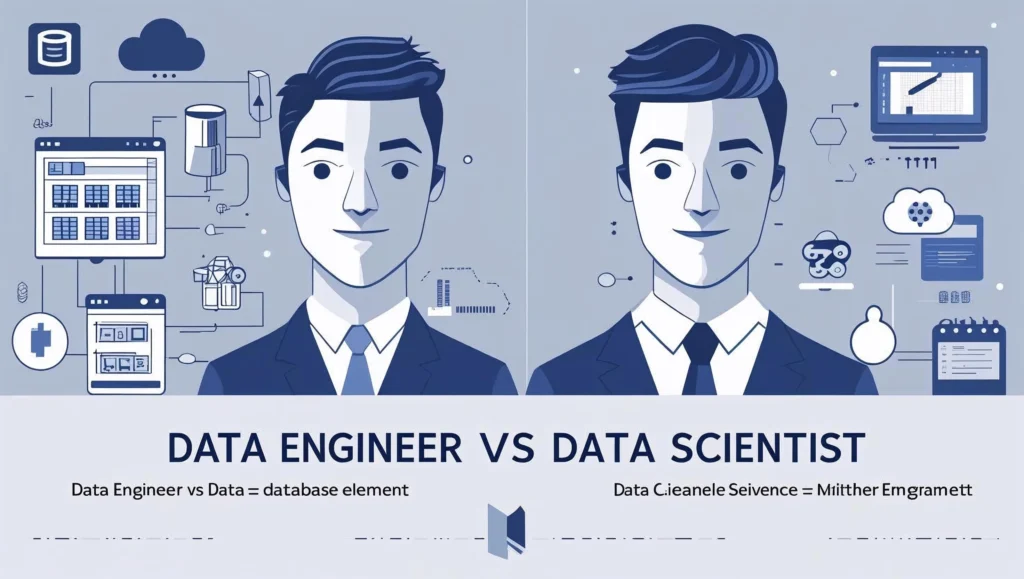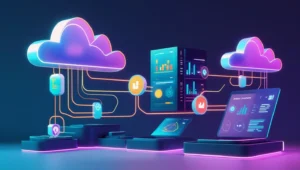Let’s be honest — if you’re just stepping into the world of data, it’s super easy to get confused. “Should I become a data engineer or data scientist?” “Do they both code?” “Who earns more?”
These questions are so common that even working professionals ask them. So, let’s break this down like a friend explaining over chai — not some robotic job description. Think of this as a story where both roles are working on the same problem — just at different layers of the data stack.
Imagine This Real-World Example
You work at a big e-commerce company. They want to predict which customers are likely to return a product based on past purchase behavior.
- The data engineer is the one who brings in all the data — from website clicks, transaction records, and warehouse returns — stores it, cleans it, structures it.
- Then comes the data scientist, who takes this clean data and runs machine learning models to predict which customer is likely to return what — and why.
So, one builds the road, the other drives the car.
What Does a Data Engineer Do?
Here’s the core role of a data engineer:
- Design and build pipelines (ETL/ELT)
- Work with massive datasets
- Clean, validate, and transform raw data
- Set up data warehouses (like Snowflake, BigQuery)
- Use tools like Airflow, Spark, Python, SQL
They are the architects behind the scenes. Without them, there is no data to analyze. Literally.
🧰 Key Skills: SQL, Python, Cloud (AWS/GCP), Spark, Kafka, Airflow, DBT, Data Modeling
🧱 Think of them as: Builders laying the foundation of the house.
What Does a Data Scientist Do?
Now, the data scientist comes into the picture once the data is clean and ready. Their main responsibilities include:
- Analyzing data patterns and trends
- Building predictive models
- Performing statistical and A/B testing
- Communicating insights through dashboards or presentations
🧠 Key Skills: Python, Statistics, Pandas, Scikit-learn, TensorFlow, SQL, Tableau/PowerBI
📊 Think of them as: Explorers mining gold from a mountain that the engineer carved out.
Skills Comparison Data Engineer vs Data Scientist — Side by Side
| Skill Area | Data Engineer | Data Scientist |
| Core Focus | Data pipelines, infrastructure | Analytics, predictions, ML |
| Languages | SQL, Python, Scala | Python, R, SQL |
| Tools | Airflow, Spark, BigQuery, DBT | Pandas, Scikit-learn, Jupyter, Tableau |
| Cloud | AWS Glue, GCP Dataflow | SageMaker, BigQuery ML |
| Maths/Stats | Basic | Advanced |
| Machine Learning | Optional | Mandatory |
| Data Viz | Optional | Very important |
Side-by-side chart comparing data engineer and data scientist skills
Which Role Has More Job Demand in 2025-2026?
📈 Truth bomb: Data engineering roles are growing faster right now.
Why?
- Every company is collecting more data than they know what to do with.
- Without proper pipelines, data science can’t even begin.
In many markets (especially India and the US), data engineer salaries are equal to or even higher than data scientists.
But — both are super valuable. One doesn’t exist without the other.
Who Should Choose What? (Career Fit)
👷♂️ Go for Data Engineering if:
- You love backend systems
- You enjoy building things that run daily and scale
- You’re excited about tools and automation
🧪 Go for Data Science if:
- You enjoy analytics and experimentation
- You’re passionate about models, predictions, and storytelling with data
- You like working closely with business and product teams
💡 And hey — it’s not uncommon to start in one and move into the other. In fact, many successful professionals shift from engineering to science (and vice versa) once they get some experience.
Salary Comparison: Who Earns More?
- In India:
- Data Engineers: ₹8–20 LPA (avg)
- Data Scientists: ₹7–18 LPA (avg)
- In the US:
- Data Engineers: $110K–$150K
- Data Scientists: $105K–$145K
📌 Note: Salaries vary a lot based on skills, city, and experience. Mastery of tools (like Spark or MLflow) can tip the scale significantly.
Can a Data Engineer Become a Data Scientist (or Vice Versa)?
Yes — and it happens a lot.
The foundational tools are the same (SQL, Python, cloud). With some effort in statistics and ML, an engineer can transition to data science. Likewise, scientists can move toward engineering by learning about pipelines, Airflow, and data warehousing.
👉 The more full-stack you are, the more powerful you become.
If you’re curious to dive even deeper into this comparison, there’s also a great resource by BairesDev: Data Scientist vs Data Engineer: Role Comparison. It highlights how the day-to-day responsibilities, required skills, and long-term career trajectories differ between these two paths. This complements what we’ve discussed here and can help you decide which role aligns better with your goals.
Final Words: Which One Is “Better”?
There’s no winner here. Both are essential to the modern data ecosystem.
If you love solving “how do we collect and organize this data?” go the engineering route. If you love asking “what insights can we get from this data?” go the science route.
Either way, the demand is huge. Just stay curious, build real projects, and don’t get stuck comparing — start doing.
While you’re exploring the difference between Data Engineers and Data Scientists, many learners also wonder how DevOps roles compare with Data Science. If you’re at a career crossroads or simply trying to understand which path fits your mindset and skillset better, we’ve broken it down clearly here: DevOps vs Data Science – What Should You Learn First?. This guide helps you evaluate both fields based on career growth, learning curve, and job roles.
🎓 Want hands-on learning for Data Engineering? Check out the Data Engineering Bootcamp — project-based, 100% practical, and covers tools like Airflow, DBT, Python, and more.
FAQ’s
1. What is the main difference between a data engineer and a data scientist?
A data engineer builds the pipelines and architecture that move and prepare data. A data scientist takes that data and runs analysis or models to find insights. One lays the road, the other drives on it.
2. Do I need to learn machine learning to be a data engineer?
Not necessarily. While understanding ML is helpful, data engineers mainly focus on data infrastructure, pipelines, and performance—not model building.
3. Who earns more: a data engineer or a data scientist?
It depends on location and company, but their salaries are often similar. In some tech companies, experienced data engineers even earn more due to the complexity of modern data platforms.
4. Which role is more technical: data engineer or data scientist?
Both are technical, but in different ways. Data engineers are closer to software engineering and systems design, while data scientists lean more into math, statistics, and experimentation.
5. Can I switch from data science to data engineering (or vice versa)?
Yes, many professionals switch based on their interests. If you’re better with systems, coding, and architecture, go engineering. If you’re drawn to patterns, analysis, and predictions, science may fit you better.
6. What programming languages do data engineers and data scientists use?
Both often use Python and SQL. Engineers also use Scala, Java, and bash scripting, while scientists dive into R, Jupyter notebooks, and Python libraries like NumPy or scikit-learn.
7. Is Python enough for both data engineering and data science?
Python is a great foundation. For data engineering, you’ll need to complement it with cloud tools, orchestration frameworks (like Airflow), and data warehousing tech. For data science, add ML libraries.
8. Is data engineering more future-proof than data science?
Both roles are in demand, but data engineering is seen as more “infrastructure critical,” especially with the explosion of big data systems. Without good engineering, science can’t even begin.
9. Which is easier to learn for a beginner: data science or data engineering?
Data science may seem easier due to visual outputs and quick wins (charts, predictions), but it requires heavy math. Data engineering is more technical but follows clearer development workflows.
10. What tools do data engineers vs data scientists use?
Engineers: Airflow, Spark, DBT, Kafka, BigQuery, AWS Glue, Snowflake
Scientists: Jupyter, Pandas, scikit-learn, TensorFlow, Power BI, Tableau
11. Do both roles need cloud knowledge?
Yes. Whether you’re storing data, training models, or automating workflows—cloud platforms (like AWS, GCP, Azure) are core to both careers.
12. Can a fresher become a data engineer or data scientist?
Absolutely. With the right skills, projects, and mindset—freshers are entering both fields. Just choose one path first and build real-world experience step by step.
13. Do data engineers write SQL queries too?
Yes—more than you’d expect! Writing efficient SQL is a must-have skill for data engineers. It’s how data gets moved, cleaned, and prepared.
14. Who works more with stakeholders and business teams?
Data scientists usually work closer with product, business, or marketing teams to derive insights. But data engineers also collaborate, especially when scoping pipelines or handling data issues.
15. Should I become a data engineer or a data scientist in 2025?
Ask yourself: do you enjoy solving infrastructure challenges and writing robust code? Go for data engineering. Love asking “why” and finding insights in messy data? Try data science. Both are rewarding—just depends on your personality and strengths.



